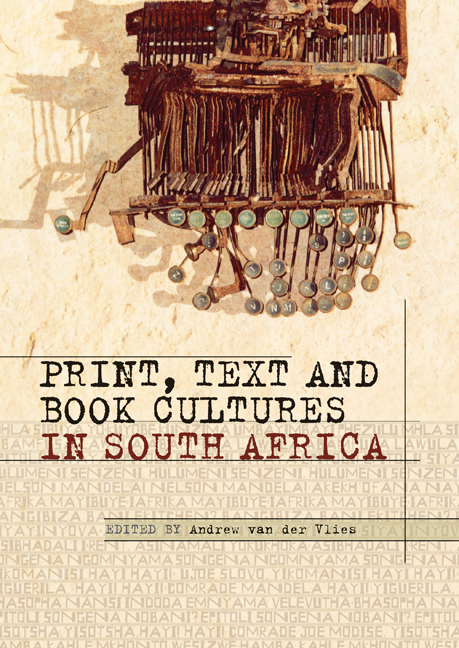Book contents
- Frontmatter
- Contents
- Acknowledgements
- Abbreviations and acronyms
- 1 Introductory
- 2 Print Cultures and Colonial Public Spheres
- 3 Local/Global: South African Writing and Global Imaginaries
- 4 Three Ways of Looking at Coetzee
- 5 Questions of the Archive and the Uses of Books
- 5.1 Colin Rae's Malaboch: The Power of the Book in the (Mis)Representation of Kgaluši Sekete Mmalebôhô
- 5.2 “Send Your Books on Active Service”: The Books for Troops Scheme during the Second World War, 1939–1945
- 5.3 From The Origin of Language to a Language of Origin: A Prologue to the Grey Collection
- 6 Orature, Image, Text
- 7 Ideological Exigencies and the Fates of Books
- 8 New Directions
- Contributors
- Index
5.1 Colin Rae's Malaboch: The Power of the Book in the (Mis)Representation of Kgaluši Sekete Mmalebôhô
from 5 - Questions of the Archive and the Uses of Books
Published online by Cambridge University Press: 21 April 2018
- Frontmatter
- Contents
- Acknowledgements
- Abbreviations and acronyms
- 1 Introductory
- 2 Print Cultures and Colonial Public Spheres
- 3 Local/Global: South African Writing and Global Imaginaries
- 4 Three Ways of Looking at Coetzee
- 5 Questions of the Archive and the Uses of Books
- 5.1 Colin Rae's Malaboch: The Power of the Book in the (Mis)Representation of Kgaluši Sekete Mmalebôhô
- 5.2 “Send Your Books on Active Service”: The Books for Troops Scheme during the Second World War, 1939–1945
- 5.3 From The Origin of Language to a Language of Origin: A Prologue to the Grey Collection
- 6 Orature, Image, Text
- 7 Ideological Exigencies and the Fates of Books
- 8 New Directions
- Contributors
- Index
Summary
On the night of 20 July 1911 a man was found lying unconscious next to his bicycle on the roadside between Southampton and Winchester. The Reverend Colin Rae had apparently been visiting his sister in Southampton and was overtaken by darkness and fatigue on his way back to Alton, where he was on a working holiday. He was taken to hospital in Winchester, where he died a week later. As reported in its Magazine, the Letherhead Parish (1911, 6) in Surrey learnt with shock about the tragic death of its beloved minister.
Thus ended the life of a rather hapless, almost colourful, 53-year-old clergyman. The fairly uneventful final years of his life in England were spent in the shadow of more adventurous younger days in South Africa. While the Letherhead Parish Magazine (1911, 7) remembered him for his “untiring energy, his assiduous visiting, his efforts to get into personal touch with all the people” and his “success in promoting Temperance work”, his most lasting legacy in South Africa was of a more secular nature. Perhaps the greatest accomplishment during Colin Rae's six-year stay in the Boer Zuid- Afrikaansche Republiek (ZAR) was the publication of a book.
Early in May 1894 a miserable Rae arrived in Pretoria from Fordsburg. He was given a temporary position in the city's Cathedral Mission (Bousfield Papers, 4 May 1894; Wakeling 1995). Just at that time, the ZAR government was commandeering English-speaking Pretorians along with the Boers for a campaign against an African community on the northern outskirts of the Transvaal. Henry Brougham Bousfield, Bishop of Pretoria, saw in Rae the ideal figure to accompany the Pretoria Commando as chaplain for the English members of the armed forces (Rae 1898, 1–5). On his return from this military experience, Rae was transferred to Roodepoort (Rae 1898, 212), another Witwatersrand parish, where he started writing a book on his war escapades. Just at the time when he was beginning work on his manuscript, Rae had an accident not unlike the more serious one that would cause his death in 1911.
- Type
- Chapter
- Information
- Print, Text and Book Cultures in South Africa , pp. 226 - 239Publisher: Wits University PressPrint publication year: 2012



